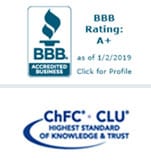With the end of 2022 on the horizon, it’s important to remember that financially, we are living in uncertain times with inflation, volatility and unpredictability. It’s more important than ever to be fiscally cautious, aware and responsible by saving, reducing taxes, reviewing investment allocations and planning for 2023.
Here are 5 key financial steps to take before 2022 runs out:
1) Max Out Contributions to Your 401(k)
No matter how close or far your retirement is, it’s essential to have a sound saving strategy. If you have an employer-sponsored 401(k), you have until December 31st to contribute for 2022.
Have automated contributions set up? You might think you have nothing to worry about. However, if your yearly contributions fall below the maximum contribution limit, you may be saving under your full potential. If your salary is increasing each year, make sure your contributions are as well! See if your employer will automatically increase your 401(k) contributions each year starting with 2023 – or take matters into your own hands by manually deciding the percentage you want to put in. It may take some self-discipline, but increasing your retirement savings now will pay off far beyond the new year!
2) Review Your Health Insurance Options
We’re currently in the thick of open enrollment season for various health care plans. Are you 65 or older? If yes, you have until December 7th to enroll in Medicare services for the upcoming year. Even if you think you’re satisfied with your current coverage, annual changes such as those being implemented by the Inflation Reduction Act make reviewing your options well worth it.
For those not yet enrolled in Medicare, there are still choices to make. If you’re currently covered by a high deductible health insurance plan through your employer, you may consider opening a Health Savings Account (HSA) or Flexible Spending Account (FSA) to supplement the cost of health care expenses. Perhaps you already have one of these accounts – if that’s the case, make sure you’re keeping track of your funds! HSA holders can carry over their funds into 2023, but the same isn’t true for FSAs. Your employer may allow you to carry over up to $570 to the next year, but anything over that must be used up by the end of 2022, or else you forfeit the remaining balance.
3) Consider Donating to Charity
Why not wrap up the year with a good deed? If you want to make the most of your donation, it’s going to require a bit more forethought than just writing a check to your charity of choice. Many forms of charitable giving are tax deductible, meaning both you and your recipient can benefit from your altruism!
The question is, how to go about it? There are several options to choose from: for example, if you’re 701/2 or older, you can make a qualified charitable contribution (QCD) directly from your IRA. Or if you’re looking for something more long term, you may consider opening a donor-advised fund. Regardless of how you make your donations, be aware that time is of the essence. If you want to make use of tax benefits for 2022, you have until December 31st to carry out your methodology.
4) Review Your Investment Allocations
As the year moves forward, so does your age. When you’re younger, it’s easier to ride out rocky stock market conditions, knowing you have time for the tides to turn your way. As you approach the retirement years, however, more stable investments like bonds and annuities start to gain a new appeal. As 2023 approaches, it may be time to reallocate your investments in a way that reflects your current financial needs and risk tolerance.
Wondering if you’re on the right track? A rule you might have heard is to subtract your age from 100. The amount that remains would be the percentage of your investments that is made up of stocks. Though, with increasing life expectancy, it may be prudent to make that number 110 or 120 instead, depending on the amount of risk you feel comfortable with.
5) Plan Your Budget for the New Year
Settled all your affairs for 2022? Don’t relax just yet – after all, 2023 is just around the corner! Planning now will help ensure you start the new year without a hitch. Starting a new job? Sending a kid to college? Investing in commercial real estate? Getting a new apartment? Be aware of the financial changes that will make this year different from the previous.
If you’re overwhelmed and don’t know where to start, don’t worry! Use this spending plan worksheet to help chart your monthly expenses. Utilize the expected and actual columns accordingly so that you can catch unexpected gaps in your anticipated and actual spending. The sooner in the year you do so, the sooner you can adjust your overall budget to keep on track.
As it turns out, the end of the year is just as much about business as it is celebration! You wouldn’t party alone – and you certainly shouldn’t do business alone either. If you have questions about retirement planning and investments, Medicare, tax planning, and more, Cowen Tax Advisory Group has you covered. Schedule a free consultation today to see how we can help you welcome the new year!
Lindsey Restelli
lindsey@cowentaxgroup.com
As Cowen Tax Advisory Group’s Digital Marketing Assistant, Lindsey provides in-house copywriting and manages the company’s electronic records system, email marketing, and blog.





